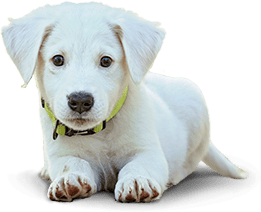As the owner of a puppy, you may come up against emergencies.
 Knowing what they are is being better able to foresee them, but also being able to do the right thing and make the right decision.
Knowing what they are is being better able to foresee them, but also being able to do the right thing and make the right decision.
Here are a few recommendations to follow in case of trauma, insect bites, poisoning, electrocution, infection or heat-stroke.
|
Trauma Puppies are lively, easily distracted, and often fail to answer their masters commands. They are all the more liable to get run over by a car. Confronted by this kind of accident, you need to keep calm and try to assess the observable injuries. Your puppy's pain and shock may make them behave abnormally, be cautious when assessing their injuries. If your dog is bleeding profusely: press the wound with a finger, or, better still, with a clean cloth, to encourage coagulation. If your dog cannot get up, handle it with great care, trying to keep it horizontal. Spinal injuries may have been sustained, too much manipulation might aggravate this type of injury. If any bone is visible, do not touch it but cover with a cloth to stop any more germs getting in. Finally, regarding injuries to the muzzle, if there are blood or saliva clots interfering with breathing, remove them with a towel, taking care not to put your fingers between its teeth: it might unintentionally bite you under the effect of pain and shock. If you dog appears unharmed after a traumatic accident: you must still consult your vet. Serious lesions can be invisible. These recommendations obviously apply to any trauma: falling from a window, fights, etc. |
|
|
Infections Being young, your puppy is especially sensitive to infectious diseases, and notably gastrointestinal ones. These may be caused by parasites, viruses or bacteria. In the most serious cases, they can cause severe dehydration and death in a matter of hours. In less severe cases, a twelve hour fast, with water constantly available, may be enough for a cure. Fasting should not be prolonged, due to the danger of hypoglycaemia. If your dog's condition worsens or the symptoms persist, you should consult your Vet. |
Insect bites and other venoms Insect bites cause swelling of the paw or muzzle, but can also lead to breathing difficulties or allergic shock. Try to extract the sting with tweezers if you can see it, and take your puppy to see the Vet, who will administer an anti-inflammatory treatment to halt allergic reaction. |
|
Electrocution If your dog has attacked an electric wire and got itself electrocuted, there may only appear local burns at first; all the same, you must take it to the Vet's, as a serious lung oedema may ensue. |
Poisoning Young pups also tend to bite and swallow almost anything. In case of poison, it is no use giving your dog milk or anything else to drink, or putting your fingers in its throat to make it vomit (failure almost assured!). You need to take it straight away to the Vet's, who will administer something to provoke vomiting before the poison gets digested. In case of convulsions, do not put your fingers in its mouth to take hold of the tongue: again, you might get bitten. Bear in mind also that not all substances have an immediate effect: good health for the first few hours is not the same thing as no toxic effect (e.g., anticoagulant rat poison). Don't forget to take the package of the poison, where the composition is mentioned: this will help treatment. |
|
Heat-stroke Simply, never leave your puppy in the car: in the sun, the inside temperature can reach 60 or 70C, causing dehydration and a state of shock in a matter of minutes (remember that the sun "goes round", and the shade shifts). In such a case, your dog needs to be cooled down as quickly as possible: douse it with cold water and take it urgently to the Vet's. Do not try leaving the window ajar: your dog could stick its head through and get stuck and hung in the door. |
|
|
Some advice Keep your puppy out of harm's way! It is just amazing how many dangers a house or a flat contains. Think about it, before anything happens. Keep everything tidy:
|
|
|
Plants & Flowers Finally, beware of beautiful plants. Indoor plants are nice for you to see, and for your dog to nibble! E.g., Diffenbachia, philodendron, poinsettia, holly and ivy. Water containing fertiliser has an exotic taste and could send your dog to the veterinary clinic. |
|






